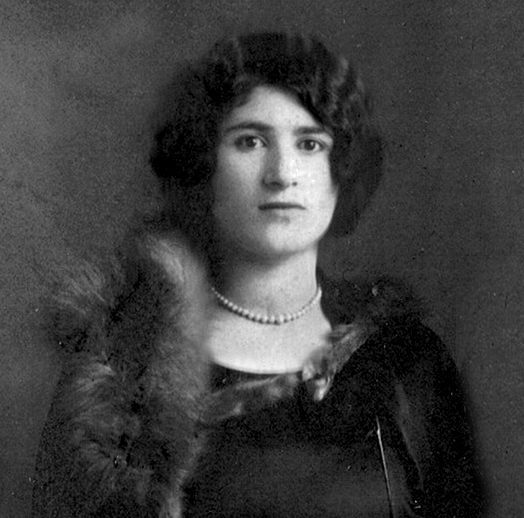Peter Baker (also known as Ahmad Ali Ferran or Bedouin Ferran), early Muslim Canadian, fur trader, politician, adventurer (born 18 April 1877 in Lebanon; died 13 November 1973 in Rochester, New York). From 1964 to 1967, Peter Baker served as an elected member of the Northwest Territories Council, making him the earliest Muslim politician in Canada. He was also the first Muslim pioneer to write a memoir of his life in Canada.
Early Life
Peter Baker was the first Muslim in Canada to write his memoirs, so we know quite a lot about his life.
He was born Ahmad Ali Ferran, in Lebanon. As a young man, he left his unnamed ancestral village in modern-day Lebanon in 1907. His decision was motivated by the fact that the Turkish army drafted all men at the age of 21. “They used to send all draftees to fight the Arab rebels in Yemen,” he writes. “Hardly any came back. They died of various disease[s] or were ultimately killed.”
Ferran left Lebanon by boat and ended up working in England, Maine, upstate New York, Boston and South Bend, Indiana.
While in Worcester, Massachusetts he worked in a kitchen at the College of the Holy Cross. There, a certain Brother Campbell decided that Ahmad Ali Ferran should have a more Western-sounding name. As a result, Ferran changed his name to “Peter Baker” because Ferran meant Baker in Arabic. Why he chose the first name “Peter” is uncertain.
Life in Canada
In 1911, Peter Baker made his way to Edmonton from Indianapolis because a friend, James Morie, had settled there and asked him to join him.
At the time, many new immigrants from the Ottoman Empire made the journey to Edmonton, “the gateway to the North.” Many hoped to make enough money to return to their home villages and start a new life. They often ended up staying, however. Baker was no exception. While many began their lives in the Prairies as peddlers and homesteaders, several went on to become shop owners and businessmen. Others moved into trades like fur trading and mink farming.
Edmonton was also on its way to becoming the epicentre of Muslim life in Canada. (See Hilwie Hamdon.) In the early 1930s, community members founded the first Muslim organizations in Canada: the Ladies’ Muslim Society and the Arabian Moslem Association. These groups, in turn, were responsible for the financing and construction of Canada’s first mosque, the Al Rashid, in 1938.
In Edmonton, Baker worked numerous jobs, including one in a store that dealt with fur pelts. There, he learned the lucrative fur trade, which would serve him well when he moved to the North.
He first went to British Columbia, where he built rooming houses for those who worked in the sawmills. Following this, he and his now business partner, James Morie, built a general store in Fort Smith, Northwest Territories. After the partnership soured, Baker stayed in the North and opened other stores. According to Dr. Aaron Hughes, he also helped other newly arrived Lebanese migrants — such as Mohamed Noghedi (aka Bud Alley) — to set up businesses and trade fur with Indigenous communities in the North, such as the Cree and Dene peoples.
“Arctic Arab”
While in the North, Peter Baker acted as a “free trader” ― an individual who traded with Indigenous communities independently of and often in competition to larger fur companies, such as the Hudson’s Bay Company. (See Fur Trade in Canada.) The company was quite upset by these “free traders.” In the mid-1920s, it lobbied the federal government to pass a law that limited all fur buying to officially sanctioned fur-buying posts. (See also HBC Trading Posts in Canada.) Baker got around this by opening up makeshift posts wherever he went.
Northern Indigenous communities gave Baker the nickname “the Arctic Arab.” Baker himself used the nickname in the title of his autobiography, Memoirs of an Arctic Arab: A Free Trader in the Canadian North, the Years 1907–1927. The work was serialized in the Yellowknife paper News of the North (now News/North). Later, after his death in 1973, it was published in book form.
Though Baker was one of the earliest Muslims in Western Canada, his memoir does not really discuss what Islam meant to him, other than the fact that he did not eat bacon. What it does document, however, is the life of a quintessential outsider with an indomitable spirit for travel and adventure, and a keen business sense.
Political Life
Later in life, Peter Baker turned to politics and was elected as a member of the Northwest Territories Council, now called the Legislative Assembly of the Northwest Territories. He served in that capacity from 1964 to 1967. He became the earliest Muslim politician in Canada, if not North America. He defeated the incumbent, E.J. “Scotty” Gall, in large part because of the Indigenous vote in the region. (See Indigenous Peoples in Canada.) Baker had traded fairly with these communities for over 40 years, and he appears to have learned Chipewyan to better communicate with them. In his capacity as councillor, he notably moved that Yellowknife should be made the capital of the Northwest Territories.
After spending most of his life in the North, he went to the United States to seek medical treatment for an eye condition brought on by snow blindness. He passed away in Rochester, New York.
Following his death, his body was transported back to Edmonton to be given a Muslim funeral at Al Rashid Mosque on 19 November 1973. He was then buried in Yellowknife.

 Share on Facebook
Share on Facebook Share on X
Share on X Share by Email
Share by Email Share on Google Classroom
Share on Google Classroom


